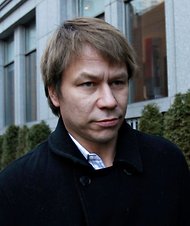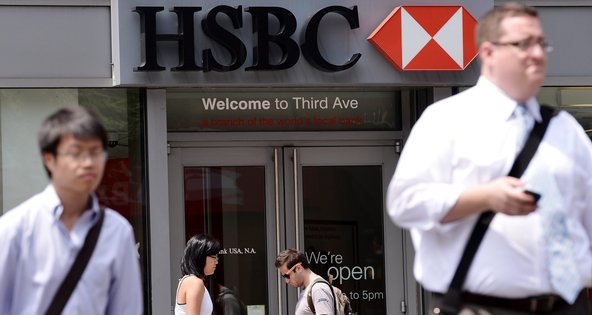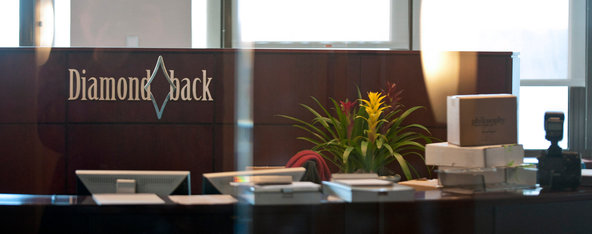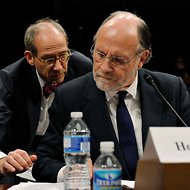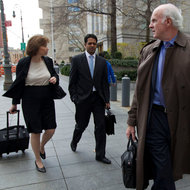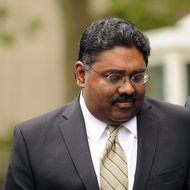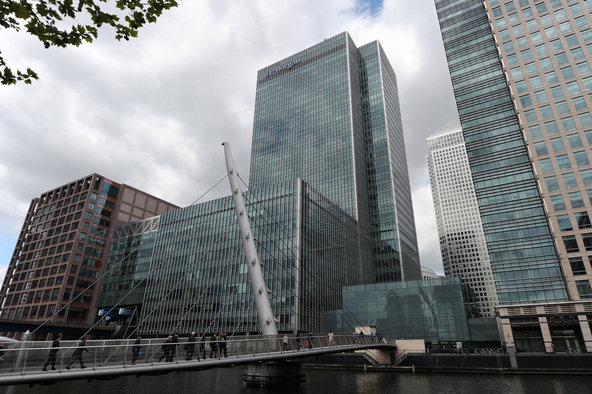 Carl Court/Agence France-Presse — Getty ImagesOffices of JPMorgan Chase in London. The trade losses were associated with London workers.
Carl Court/Agence France-Presse — Getty ImagesOffices of JPMorgan Chase in London. The trade losses were associated with London workers.
Federal authorities are using taped phone conversations to build criminal cases related to the multibillion-dollar trading loss at JPMorgan Chase, focusing on calls in which employees openly discussed how to value the troubled bets in a favorable way.
Investigators are looking into the actions of four people who previously worked for the team based in London responsible for the $6 billion loss, according to officials briefed on the case. The Federal Bureau of Investigation could make some arrests in the next several months, said one person who spoke on the condition of anonymity because the inquiry was ongoing.
The phone recordings, which were turned over to authorities by JPMorgan, have helped focus the investigation, the officials said. Authorities are poring over thousands of conversations, in English and French. They are also relying on notes that employees took during staff meetings, instant messages circulated among traders and e-mails sent within the group.
Authorities are examining how some traders in the chief investment office influenced market prices as their bets began to sour. Investigators are also looking into whether records were falsified to hide the problems from executives in New York. Based on those records, JPMorgan submitted inaccurate financial statements to regulators, another area of focus for investigators.
The scope of the inquiry suggests that the problems were isolated to a handful of executives and traders in an overseas division, and did not reflect a fundamental weakness with the bank’s culture and leadership. The investigation does not appear to touch the upper echelons of the executive suite, notably Ina Drew who oversaw the chief investment office. The findings could insulate JPMorgan and its chief executive, Jamie Dimon, from further fallout.
Timeline: JPMorgan Trading Loss
Five months into the investigation, attention is centered on four people: Javier Martin-Artajo, a manager who oversaw the trading strategy from the bank’s London offices; Bruno Iksil, the trader known as the London Whale for placing the outsize bet; Achilles Macris, the executive in charge of the international chief investment office; and a low-level trader, Julien Grout, who worked for Mr. Iksil and was responsible for marking the trading book.
The people briefed on the matter said the investigation was in the early stages, and federal prosecutors in Manhattan had not made a decision about whether to file charges. None of the current or former employees have been accused of wrongdoing.
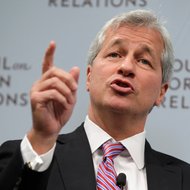 Yuri Gripas/ReutersJamie Dimon, the chief of JPMorgan Chase.
Yuri Gripas/ReutersJamie Dimon, the chief of JPMorgan Chase.
If they decide to bring charges, prosecutors will face significant challenges. Financial cases are notoriously difficult to prove in court. The intricacies of Wall Street, which are often central to such matters, can be difficult to explain to jurors. In the aftermath of the financial crisis, authorities have brought few cases against individual employees.
Complicating matters, some of the JPMorgan employees are from France, which does not extradite its citizens. Mr. Iksil has already returned home to France after leaving the bank, according to a person with knowledge of the matter. Mr. Grout, also a French citizen, has been suspended from the bank but remains in London, said another person briefed on the situation.
Prosecutors would also have to prove that employees intentionally masked losses by mispricing the positions. It is a high bar. In some derivatives markets, traders are allowed to estimate the value of their positions because actual prices may not be readily available.
Some people close to the investigation say the significance of the mismarked positions may be overstated since they represented a tiny fraction of the overall trades. They also cautioned that authorities could easily take an incriminating sentence from a single phone call out of context, and that many conversations took place in person at the London office.
“Mr. Martin-Artajo is confident that when a complete and fair reconstruction of these complex events is completed, he will be cleared of any wrongdoing,” his lawyer, Greg Campbell, said in a statement. “There was no direct or indirect attempt by him at any time to conceal losses.”
Lawyers for Mr. Macris and Mr. Grout declined to comment. A lawyer for Mr. Iksil did not respond to requests for comment. Spokesmen for the United States attorney’s office in New York, the F.B.I. in Manhattan and JPMorgan declined to comment.
The trading loss could get further scrutiny on Friday when JPMorgan is set to report third-quarter earnings. Since the blowup was first disclosed in May, the losses have increased to about $6 billion, from $2 billion.
As the bank continues to unwind the bet, investigators have held multiple meetings with lawyers representing people involved in the matter. Authorities plan to interview Mr. Macris this month in his native Greece, according to people briefed on the matter. Such discussions could provide a more detailed account of the employees’ actions and alter the course of the investigation. Some of the former employees could also cooperate with authorities.
While authorities are narrowing the focus of the criminal investigations, JPMorgan and its executives still face scrutiny from civil regulators, including the Securities and Exchange Commission, which is examining whether the bank misled investors about the severity of the losses. British authorities have also recently opened inquiries into the matter, according to the officials.
The trading losses have already prompted a broader management shuffle. Ms. Drew resigned in May. Douglas L. Braunstein, the bank’s chief financial officer, is expected to step down from his post later this year, according to two people with knowledge of the situation.
The investigations center on the chief investment office in London.
The group was created to invest JPMorgan’s own money and offset potential losses across the bank’s disparate businesses. For example, Mr. Iksil bought and sold derivative contracts — financial instruments tied to the value of corporate bonds and other investments — in an effort to protect the bank from market fluctuations.
By early 2012, the London team increased its risk. In response to adverse moves in the markets and regulatory changes, the group made a series of aggressive derivatives trades, betting on the strength of companies like American Airlines.
As these bets started to sour, the London team decided to double down instead of getting out, according to the bank. From late 2011 to March 2012, the bank’s net exposure to such contracts more than doubled to nearly $150 billion. Authorities are examining whether the large positions improperly influenced market prices.
The phone calls, which are taped as a part of JPMorgan’s routine practices, suggest that traders tried to limit the losses, according to people briefed on the matter. In some phone recordings, Mr. Martin-Artajo encouraged Mr. Iksil to record the value of certain trades in an optimistic fashion, the people said. Their boss, Mr. Macris, was also involved in valuation discussions, according to two people with knowledge of the matter.
The chief investment office was also trying to play down the potential risk. Some employees told top JPMorgan executives that the situation was “manageable” and that the position might even produce a slight gain in the second quarter of 2012.
But the estimates proved inaccurate. This summer, JPMorgan restated its first-quarter earnings downward by $459 million, conceding errors in the valuations.
At the time, the bank said that the traders in the chief investment office “generally” valued the holdings within a reasonable range. But JPMorgan also pointed to the potential for deeper problems.
“The restatement is really based upon recent facts that we’ve uncovered regarding the C.I.O. traders’ intent as they were marking the book,” Mr. Braunstein, the bank’s chief financial officer, said at the time, according to a transcript. “As a result, we questioned the integrity of those trader marks.”
Article source: http://dealbook.nytimes.com/2012/10/10/at-jpmorgan-inquiry-built-on-taped-calls/?partner=rss&emc=rss
